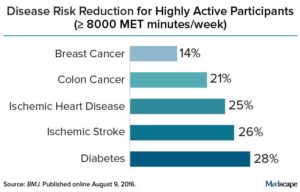 Get active, really active, to reduce your risk for 5 diseases: breast cancer, colon cancer, heart disease, and ischemic stroke. Instead of the 150 minutes of brisk walking or 75 minutes per week of running (which is equal to the 600 metabolic equivalent (MET) minutes now recommended by the World Health Organization), this study found that much more exercise is needed for best health results.
Get active, really active, to reduce your risk for 5 diseases: breast cancer, colon cancer, heart disease, and ischemic stroke. Instead of the 150 minutes of brisk walking or 75 minutes per week of running (which is equal to the 600 metabolic equivalent (MET) minutes now recommended by the World Health Organization), this study found that much more exercise is needed for best health results.
This study (which was a review and analysis of 174 studies) found that there is a dose-response effect, with the most reduction in the risk of the 5 conditions by getting 3000 to 4000 MET minutes per week. This sounds like a lot, but the researchers point out that this can be achieved by incorporating exercise into your daily routines. The researchers write: "A person can achieve 3000 MET minutes/week by incorporating different types of physical activity into the daily routine—for example, climbing stairs 10 minutes, vacuuming 15 minutes, gardening 20 minutes, running 20 minutes, and walking or cycling for transportation 25 minutes on a daily basis would together achieve about 3000 MET minutes a week."
So start thinking creatively about how to increase exercise or activity into your daily life, especially moderate or vigorous intensity activity. For example, park your car far from the store door, or better yet, bicycle or walk to the store from home. From Medscape:
Get Moving: High Physical-Activity Level Reduces Risk of 5 Diseases
High levels of physical activity can reduce the risk for five major diseases, including type 2 diabetes, new research shows. Findings from the systematic review and meta-analysis were published online ....The data, from a total 174 studies comprising 149,184,285 total person-years of follow-up, suggest that the more total regular daily physical activity one engages in — including recreation, transportation, occupational activity, and/or daily chores — the lower the risks for breast cancer, colon cancer, diabetes, ischemic heart disease, and ischemic stroke.
However, significant reductions in those conditions were seen only with total activity levels considerably higher than the minimum 600 metabolic equivalent (MET) minutes per week recommended by the World Health Organization for health benefits. That 600 METs equates to about 150 minutes/week of brisk walking or 75 minutes/week of running. (A MET is defined as the ratio of the metabolic rate during that activity to the metabolic rate when resting.) Risks of the five conditions dropped significantly with an increase in MET minutes per week from 600 to 3000 to 4000, with less additive benefit seen above that level.
For reference, the authors say, "a person can achieve 3000 MET minutes/week by incorporating different types of physical activity into the daily routine — for example, climbing stairs 10 minutes, vacuuming 15 minutes, gardening 20 minutes, running 20 minutes, and walking or cycling for transportation 25 minutes on a daily basis would together achieve about 3000 MET minutes a week." "This amount might seem a bit large, but this is about total activity across all domains of life.…For people who currently don't exercise, clinicians could encourage them to incorporate physical activity into their daily routines, [such as] turning household chores into exercise.
Another recent meta-analysis of trials involving more than one million individuals indicated that an hour of moderate-intensity activity, such as brisk walking or cycling, offsets the health risks of 8 hours of sitting. The message that physical inactivity is a killer — leading to 5.3 million premature deaths annually worldwide, which is as many as caused by smoking and twice as many as associated with obesity, has been emerging over the past few years, with warnings that "sitting is the new smoking."
This new research is the first meta-analysis to quantify the dose-response association between total physical activity across all domains and the risk of five chronic diseases. The 174 prospective cohort studies included 35 for breast cancer, 19 for colon cancer, 55 for diabetes, 43 for ischemic heart disease, and 26 for ischemic stroke. (Some included more than one end point.)....Higher levels of total physical activity were associated with lower risks of all five outcomes.
With the development of diabetes, for example, compared with no physical activity, those with 600 MET minutes per week (the minimum recommended level of activity) had a 2% lower risk. That risk reduction jumped by an additional 19% with an increase from 600 to 3600 METs/week. Gains were smaller above that, with the increase of total activity from 9000 to 12,000 MET minutes/week yielding only an additional 0.6% diabetes reduction.
Overall, compared with insufficiently active individuals (total activity < 600 MET minutes/week), the risk reduction for those in the highly active category (≥ 8000 MET minutes/week) was 14% for breast cancer; 21% for colon cancer; 28% for diabetes; 25% for ischemic heart disease; and 26% for ischemic stroke.
 Credit: Medscape
Credit: Medscape

 Another interesting study looking at whether being overweight is linked to premature death, heart attacks, and diabetes. This study looked at sets of twins, in which one is heavier than the other, and followed them long-term (average 12.4 years) and found that NO - being overweight or obese (as measured by Body Mass Index or BMI) is NOT associated with premature death or heart attack (myocardial infarction), but it is associated with higher rates of type 2 diabetes. These results are in contrast with what
Another interesting study looking at whether being overweight is linked to premature death, heart attacks, and diabetes. This study looked at sets of twins, in which one is heavier than the other, and followed them long-term (average 12.4 years) and found that NO - being overweight or obese (as measured by Body Mass Index or BMI) is NOT associated with premature death or heart attack (myocardial infarction), but it is associated with higher rates of type 2 diabetes. These results are in contrast with what  Studies have found that increased nut consumption has been associated with
Studies have found that increased nut consumption has been associated with  Another view of type 2 diabetes - that the gut microbiome is involved, specifically two gut bacteria: Prevotella copri and Bacteroides vulgatus. View them as the bad guys. The researchers point out "... the majority of overweight and obese individuals are insulin resistant and it is well known that dietary shifts to less calorie-dense eating and increased daily intake of any kind of vegetables and less intake of food rich in animal fat tend to normalize imbalances of gut microbiota and simultaneously improve insulin sensitivity of the host." In other words, eat more vegetables and fewer calories (if you're overweight or obese) to improve the gut microbes. This is similar to yesterday's post of
Another view of type 2 diabetes - that the gut microbiome is involved, specifically two gut bacteria: Prevotella copri and Bacteroides vulgatus. View them as the bad guys. The researchers point out "... the majority of overweight and obese individuals are insulin resistant and it is well known that dietary shifts to less calorie-dense eating and increased daily intake of any kind of vegetables and less intake of food rich in animal fat tend to normalize imbalances of gut microbiota and simultaneously improve insulin sensitivity of the host." In other words, eat more vegetables and fewer calories (if you're overweight or obese) to improve the gut microbes. This is similar to yesterday's post of  Of course eating meals prepared at home is healthier! The
Of course eating meals prepared at home is healthier! The  A second study was just published about the benefits of eating whole grains daily - again a significantly lower risk of premature death, and again the effects were dose-related. That is, the more whole grains eaten daily, the lower the risk of early death. Like the
A second study was just published about the benefits of eating whole grains daily - again a significantly lower risk of premature death, and again the effects were dose-related. That is, the more whole grains eaten daily, the lower the risk of early death. Like the  A plant-based diet (eating lots of plant foods - fruits, vegetables, whole grains, legumes, seeds and nuts) once again shows health benefits in a
A plant-based diet (eating lots of plant foods - fruits, vegetables, whole grains, legumes, seeds and nuts) once again shows health benefits in a  As we know, chronic inflammation is linked to cancer and other diseases. It is long-term persistent low-grade inflammation, and it has a "wear and tear" effect on the body. What causes chronic inflammation? Being overweight or obese, sedentary lifestyle, Western (low fiber, high processed foods and meat) diet, chronic illnesses, viruses or bacteria (e.g., gum disease), smoking, air pollution, stress, excessive alcohol intake. It often does not have symptoms, but doctors can test for C-reactive protein levels (CRP), which increase when the body is inflamed. So you absolutely want to lower chronic inflammation if you can.
As we know, chronic inflammation is linked to cancer and other diseases. It is long-term persistent low-grade inflammation, and it has a "wear and tear" effect on the body. What causes chronic inflammation? Being overweight or obese, sedentary lifestyle, Western (low fiber, high processed foods and meat) diet, chronic illnesses, viruses or bacteria (e.g., gum disease), smoking, air pollution, stress, excessive alcohol intake. It often does not have symptoms, but doctors can test for C-reactive protein levels (CRP), which increase when the body is inflamed. So you absolutely want to lower chronic inflammation if you can.